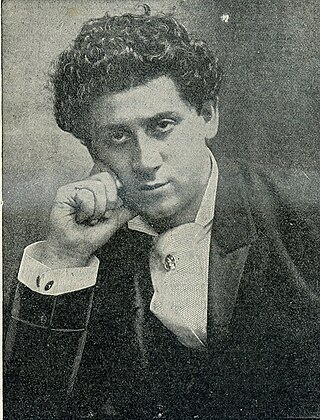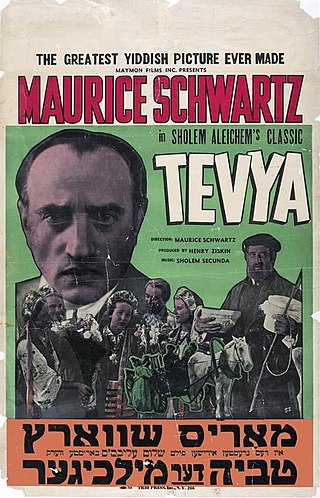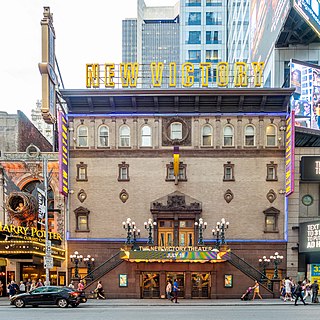Related Research Articles

The Apollo Theater is a multi-use theater at 253 West 125th Street in the Harlem neighborhood of Upper Manhattan in New York City. It is a popular venue for black American performers and is the home of the TV show Showtime at the Apollo. The theater, which has approximately 1,500 seats across three levels, was designed by George Keister with elements of the neoclassical style. The facade and interior of the theater are New York City designated landmarks and are listed on the National Register of Historic Places. The nonprofit Apollo Theater Foundation (ATF) operates the theater, as well as two smaller auditoriums at the Victoria Theater and a recording studio at the Apollo.

Stella Adler was an American actress and acting teacher.

Boris Thomashefsky, born Boruch-Aharon Thomashefsky, was a Ukrainian-born Jewish singer and actor who became one of the biggest stars in Yiddish theater.

Celia Feinman Adler was an American actress, known as the "First Lady of the Yiddish Theatre".

The Palace Theatre is a Broadway theater at 1564 Broadway, facing Times Square, in the Midtown Manhattan neighborhood of New York City. Designed by Milwaukee architects Kirchhoff & Rose, the theater was funded by Martin Beck and opened in 1913. From its opening to about 1929, the Palace was considered among vaudeville performers as the flagship of Benjamin Franklin Keith and Edward Franklin Albee II's organization. The theater had 1,743 seats across three levels as of 2018.

The Ed Sullivan Theater is a theater at 1697–1699 Broadway, between 53rd and 54th Streets, in the Theater District of Midtown Manhattan in New York City. Built from 1926 to 1927 as a Broadway theater, the Sullivan was developed by Arthur Hammerstein in memory of his father, Oscar Hammerstein I. The two-level theater was designed by Herbert J. Krapp with over 1,500 seats, though the modern Ed Sullivan Theater was downsized to 370 seats by 2015. The neo-Gothic interior is a New York City landmark, and the building is on the National Register of Historic Places.

The Broadway Theatre is a Broadway theater at 1681 Broadway in the Theater District of Midtown Manhattan in New York City. Opened in 1924, the theater was designed by Eugene De Rosa for Benjamin S. Moss, who originally operated the venue as a movie theater. It has approximately 1,763 seats across two levels and is operated by The Shubert Organization. The Broadway Theatre is one of the few Broadway theaters that is physically on Broadway.

Tevya is a 1939 American Yiddish film, based on author Sholem Aleichem's stock character Tevye the Dairyman, also the subject of the 1964 musical Fiddler on the Roof. It was the first non-English language picture selected for preservation by the National Film Registry.
The Beacon Theatre is an entertainment venue at 2124 Broadway, adjacent to the Hotel Beacon, on the Upper West Side of Manhattan in New York City. Opened in 1929, the Beacon Theatre was developed by Samuel "Roxy" Rothafel and built as a movie palace, with 2,894 seats across three levels. It was designed by Walter W. Ahlschlager with decorations inspired by the Renaissance, Ancient Roman, Ancient Greek, and Rococo styles. The theater is designated as a New York City interior landmark and is listed on the National Register of Historic Places.

The New Victory Theater is a theater at 209 West 42nd Street in the Theater District of Midtown Manhattan in New York City, near Times Square. Built in 1900 as the Republic Theatre, it was designed by Albert Westover and developed by Oscar Hammerstein I as a Broadway theater. The theater has been known by several names over the years, including the Belasco Theatre, Minsky's Burlesque, and the Victory Theatre. The theater is owned by the city and state governments of New York and leased to nonprofit New 42, which has operated the venue as a children's theater since 1995. The New Victory presents theater shows, dance shows, puppet shows, and other types of performance art shows from all around the world.

Yidl Mitn Fidl, is a 1936 musical Yiddish film.

Hugo Zuckermann was a Jewish-Austrian poet and Zionist.

Henry Lynn was a film director, screenwriter, and producer, who concentrated on Yiddish life and culture in the United States in the years 1932–1939, the era of Yiddish film in America. Lynn was an innovator in sound technology, frequently commissioned original music, and he used popular radio and opera stars Boris Thomashefsky, Esther Field, and Seymour Rechzeit, as well as New York stage actors like Celia Adler.

The Empire Theatre is a former Broadway theater at 234 West 42nd Street in the Theater District of Midtown Manhattan in New York City. Opened in 1912, the theater was designed by Thomas W. Lamb for the Hungarian-born impresario A. H. Woods. It was originally named for female impersonator Julian Eltinge, a performer with whom Woods was associated. In 1998, the building was relocated 168 feet (51 m) west of its original location to serve as the entrance to the AMC Empire 25, a multiplex operated by AMC Theatres, which opened in April 2000.

Village East by Angelika is a movie theater at 189 Second Avenue, on the corner with 12th Street, in the East Village of Manhattan in New York City. Part of the former Yiddish Theatre District, the theater was designed in the Moorish Revival style by Harrison Wiseman and built from 1925 to 1926 by Louis Jaffe. In addition to Yiddish theatre, the theater has hosted off-Broadway shows, burlesque, and movies. Since 1991, it has been operated by Angelika Film Center as a seven-screen multiplex. Both the exterior and interior of the theater are New York City designated landmarks, and the theater is on the National Register of Historic Places.

Yiddish cinema refers to the Yiddish language film industry which produced some 130 full-length motion pictures and 30 short during its heyday from 1911 and 1940. Yiddish film almost disappeared after World War II, due to the Holocaust and the linguistic acculturation of Jewish immigrants, though new pictures are still made sporadically.
Alex Weiser is an American composer of contemporary classical music.

Florence Weiss was a Russian-born American Yiddish theatre, Vaudeville and film actor, recording artist, and soprano who was active from the 1920s to the 1960s. She worked and performed with such artists as Moishe Oysher, Alexander Olshanetsky, Boris Thomashefsky, Fyvush Finkel, and Abe Ellstein. The height of her popularity was during the 1930s, when she often toured and performed with her then-husband, Moishe Oysher, and appeared in three Yiddish-language films with him: The Cantor's Son, The Singing Blacksmith, and Overture to Glory.

Samuel Goldenberg (1883/1884–1945) was an actor in Yiddish theatre on stage and screen.
Shir Hashirim is Hebrew for the erotic poem The Song of Songs.
References
- 1 2 3 4 5 "Lynn's Yiddish Feature Finished In New York". The Hollywood Reporter . 29 (21): 4. September 23, 1935. ISSN 0018-3660. ProQuest 2297259085.
- ↑ Hoberman 1991, pp. 207–208.
- 1 2 3 Hoberman 1991, p. 208.